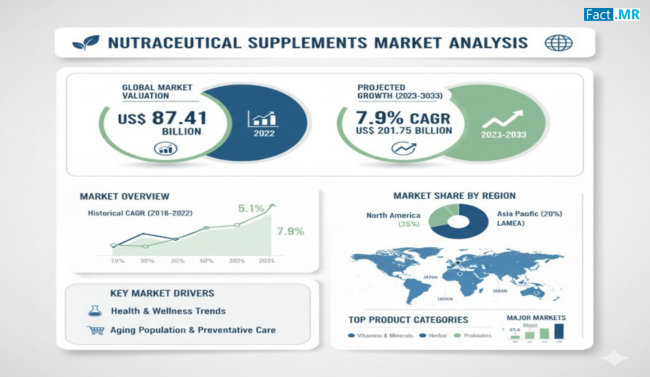The globalnutraceutical supplements market is witnessing remarkable growth, driven by increasing consumer focus on health, wellness, and preventive care. Nutraceuticals—products derived from food sources offering extra health benefits—have become an integral part of daily dietary routines worldwide. This rise is fueled by the growing prevalence of chronic conditions such as diabetes, obesity, and cardiovascular diseases, along with an aging global population seeking ways to maintain vitality and well-being.
Market Overview:
Nutraceutical supplements encompass a wide variety of products including vitamins and minerals, proteins and amino acids, prebiotics and probiotics, and herbal formulations. These supplements aim to provide targeted health benefits, from strengthening immunity to supporting metabolic health and improving cognitive function. The surge in health consciousness, particularly in urban populations, has significantly boosted the demand for such supplements, making them a mainstream component of modern nutrition.
Key Trends:
Several trends are shaping the nutraceutical supplements market. One of the most notable is the shift toward personalized nutrition. Consumers increasingly monitor their health metrics and dietary intake, seeking supplements tailored to their specific needs. This trend is supported by technological advancements in diagnostics, mobile health apps, and wearable devices that allow individuals to optimize their nutrition based on real-time data.
The market is also witnessing a growing preference for specialty ingredients. Functional components such as omega-3 fatty acids, antioxidants, and plant-based extracts are gaining traction due to their health-promoting properties. Manufacturers are investing in research and development to enhance the efficacy, bioavailability, and sensory appeal of these supplements, ensuring consumers receive maximum health benefits without compromising on taste or convenience.
Another emerging trend is the popularity of on-the-go nutritional products. Busy lifestyles are driving the demand for easily consumable supplements, such as softgels, powders, and drinkable formulations, that fit seamlessly into daily routines. This trend is particularly pronounced in regions with high urbanization and working populations.
Regional Insights:
The United States is a significant market for nutraceutical supplements, with rising demand driven by the aging population and the prevalence of lifestyle-related diseases. Consumers are increasingly turning to dietary supplements, liquid formulations, and fortified foods to address their nutritional needs and manage chronic conditions. Well-established healthcare infrastructure and the presence of key market players further strengthen the U.S. market.
In Asia-Pacific, countries like South Korea and Japan are experiencing growing demand due to hectic lifestyles and increased consumption of convenience foods. Economic growth, urbanization, and higher disposable incomes are fueling consumer interest in fortified nutrition products. Meanwhile, Europe continues to value preventive health measures, contributing to sustained market growth in the region.
Product Insights:
Among various types of nutraceutical supplements, vitamin and mineral products are witnessing the highest demand. Their role in boosting immunity, supporting bone health, and preventing nutrient deficiencies has made them a staple in daily nutrition. Protein and amino acid supplements are gaining popularity among fitness enthusiasts and aging populations looking to maintain muscle mass and metabolic health.
Softgels and other bioavailable forms of supplements are preferred due to ease of consumption and enhanced absorption. Innovations in delivery formats, including chewables, powders, and functional beverages, are catering to diverse consumer preferences and lifestyles.
Challenges in the Market:
Despite robust growth, the nutraceutical supplements market faces challenges. Stringent regulatory frameworks and complex approval processes can pose barriers to market entry. Manufacturers must ensure product safety, quality, and efficacy, often requiring significant investment in research and testing. Additionally, educating consumers about the benefits and correct usage of supplements remains crucial for sustained adoption.
Opportunities for Innovation:
Startups and established players alike are leveraging opportunities in product innovation and R&D collaborations. Partnerships with scientific communities and health organizations help create advanced formulations that meet specific health needs. There is also a rising focus on sustainability and clean-label products, with consumers preferring natural, ethically sourced ingredients.
Conclusion:
The nutraceutical supplements market represents a dynamic intersection of health, science, and consumer demand. Rising awareness of preventive healthcare, personalized nutrition, and functional food solutions is driving long-term growth. With continuous innovation in product development, delivery formats, and specialized ingredients, nutraceutical supplements are poised to remain a key component of global health and wellness strategies in the years ahead.
Takeaway:
For consumers and businesses alike, understanding the trends, regional dynamics, and product innovations in the nutraceutical supplements market is essential. Whether it’s enhancing daily nutrition, managing chronic conditions, or adopting personalized wellness strategies, nutraceuticals are reshaping the approach to health and lifestyle choices globally.



